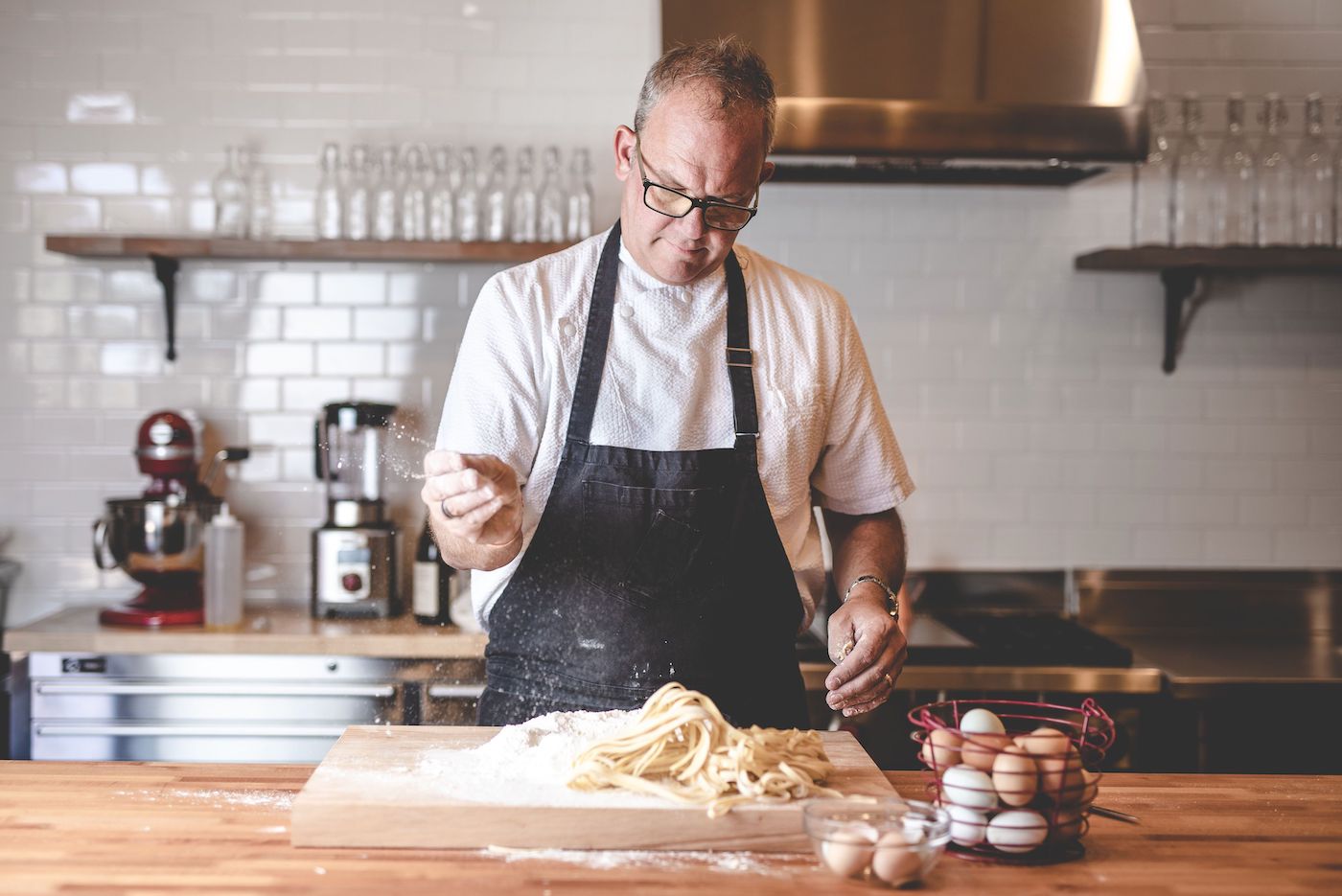From Town to Country
Where in the world is Chef James Porter? A native Arizonan, he is celebrated for his popular Scottsdale restaurants Tapino and Petite Maison, where he garnered many awards including the 2009 Edible Phoenix Local Hero Award. Always engaged in innovative approaches with the highest standards, Porter has turned his talents to new ventures.
The latest are Terra farm + manor and its related heritage meat business; plus a partnership in Breadworks with chef and master baker MJ Coe. It’s an impressive line-up of enterprises in which Porter supports the best agricultural and culinary practices, resulting in the finest possible food products.
Breadworks, a predominantly wholesale bakery, serves select restaurants across Arizona with artisan loaves, sandwich breads, pretzels, English muffins, sourdough and breakfast selections.
A truly special ingredient they use is heirloom white Sonoran wheat sourced from Oatman Ranch. Located in Gila Bend, it is Arizona’s first, certified, regenerative farm growing organic grains. The farm’s story is one of revival and survival, highlighting how barren and depleted farmland can be resurrected to sustainably produce much needed crops to feed our state. By sourcing from Oatman Ranch, Porter and Coe are helping to keep productive, sustainable grain crops part of our Arizona food system. Hats off to them!
Terra farm + manor is an endeavor based on those same visionary principles of good land stewardship and sustainable methods. Located on an old, homesteaded ranch and remotely situated in the high-desert Prescott National Forest, the setting is rustic and off-grid.
The lodge, however, is luxuriously appointed with local art, native textiles, and sheets made from Arizona-grown cotton. There is an expansive terrace and dining room; the teaching kitchen where cooking classes take place is nothing less than state-of-the-art. In this spectacular setting, Porter artfully prepares the food of his dreams and shares his inspirations with his guests. Most of what he cooks is produced on the land where he lives and works, or on a nearby farm.
“Just because it is locally grown doesn’t necessarily mean it is good,” says Porter. “I want to give my guests the best food, so even if I don’t produce it myself here on the farm, I source it from other local growers who have the high standards and quality I seek.”
The heirloom breeds of animals raised on the farm are noteworthy. They include: pure-bred tajima wagyu beef, Iberico pigs; Icelandic sheep; Nubian goats and copper Maran chickens. We have chosen breeds that thrive in an arid high desert” says Porter.
“The breed of the animal matters because its specific characteristics determine the oleic fat content and its distribution through the meat.”
This evenly veined distribution of fat, or marbling, is a highly desirable characteristic for good flavor and tenderness in the beef, lamb, and pork.
In keeping with traditional regenerative approach, the cattle and sheep forage on the native grasses and plants of the open range, in winter they are fed locally grown hay. Just as in Spain and Portugal, the Iberico pigs are fed acorns harvested from higher elevations, the flavor of the meat is incomparable.
The Nubian goats thrive on high desert scrub and supplemental hay, providing milk for cooking, cheese, and yogurt. The copper Maran chickens process insects, table scraps, small plants, seeds, and grains, transforming them into delicious eggs. Food waste and manure are composted and spread, enriching the forage on which the animals feed. It’s an old-world, place-based, vertical production system, starting with the soil which nurtures the native plants, which feed the animals, which feed the people. The superior flavor of the meat reflects the terroir—the land on which it was raised.
The livestock do not go to feed lots. “To finish the beef before harvest, they are fed a ration for a year on irrigated pastures of regenerative forage; clover, vetch, and grass. We add to that pumpkins and acorn squash from the garden. They actually like the squashes,” he says.
The distinctive terroir of Terra is discernible in the lamb as well. “Our lamb is mild, super earthy but not gamey. They nurse for about 90 days, and we harvest them at around 10 months. They have super flavor from mom’s milk and sweet grass. They live totally outdoors, and we let them clean out the greenhouses before we start a new planting in there.”
“The ewes are fed alfalfa and a small portion of grain during gestation and lactation over the winter months.” Reviving an old-school tool of regenerative land management to maintain grazing lands, Porter tells me, “Our plan now is to take the sheep to lower elevation pastures in winter in southern Arizona where they can be used in a collaborative effort for weed control on the range.”
Guests at Porter’ table will enjoy a unique dining experience. The menus and dishes are not complex feats of culinary bravado, but simple and elegant creations to showcase the distinct flavors, herbaceousness, and natural character of the foodstuffs. “Keep it simple, stupid’—this is my message,” he says.
He presents traditional artisan foods and recipes as well as unique dining options, such as cuts of meat unfamiliar to many people. “I’ll cook cuts such as a skirt steak, or Denver cut, which is a Japanese cut from the top round of beef.”
A stay at Terra farm + manor is an extraordinary experience of what the best food can be. It is the antithesis of fast food. But, even as he advocates for good nutrition and healthy, delicious food for all people, Porter believes convenience is also desirable and necessary. It is often the first choice for many people, even if not always out of necessity.
“I’m an equal opportunist. I’ll go for convenience too and eat at McDonald’s on occasion.”
Consider Terra farm + manor not only as a special getaway, but also a way to show support for a model of sustainable land management, regenerative agricultural methods, humane practices, and highest quality products. Here Porter has created an opportunity for people to learn culinary skills and understand the full trajectory of the authentic farm-to-table, vertical food chain. It is all about healthy land, healthy animals, fresh and delicious food prepared with simplicity, and memorable dining in a convivial setting.
It’s a perfect recipe for healthy, happy people.





